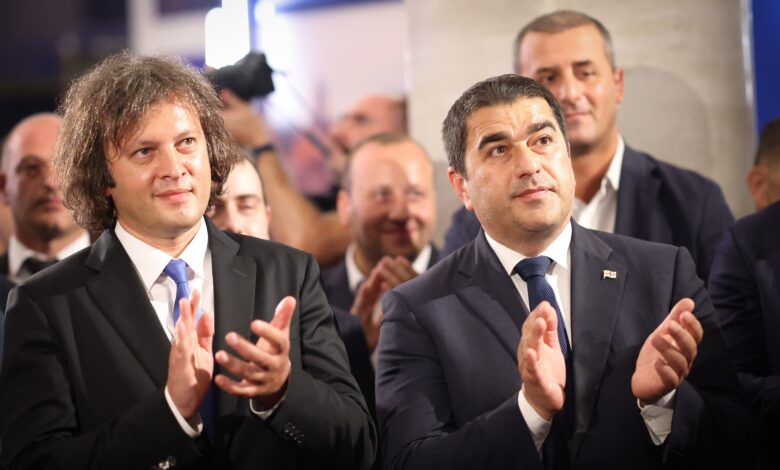
GD Attacks Western Ambassadors After Pro-Gov’t Media Alleges Opposition Meetings
Georgian Dream leaders have intensified attacks on Western ambassadors, accusing them of meddling in domestic politics and violating international conventions after pro-government media reported on their alleged meetings with opposition politicians.
TV Imedi, the ruling party’s main propaganda channel, claimed on September 16 that Elene Khoshtaria, leader of the opposition Droa party, who was detained a day earlier for scribbling on a campaign banner of Tbilisi Mayor Kakha Kaladze, visited Dutch Ambassador Meline Arakelian at her residence before her arrest.
“This is nothing but yet another encouragement of radicalism. It is a gross violation of the Vienna Convention, a direct interference in democratic elections,” GD Prime Minister Irakli Kobakhidze told journalists about Khoshtaria and Arakelian’s alleged meeting, shortly after TV Imedi’s report.
GD Parliament Speaker Shalva Papuashvili called it “shocking” that an “accredited diplomat from a foreign country meets an extremist politician in an informal setting after she committed a politically motivated crime.”
Later that day, Imedi reported it had “accidentally recorded” opposition politicians Gia Baramidze of the United National Movement (UNM) and Giga Bokeria of the Federalists leaving what it described as a “secret meeting” at the British Embassy. “Baramidze says he spoke with the representative of the British Foreign Office about the October 4 rally,” the report added.
The GD authorities’ fresh attacks on ambassadors come as part of the GD rhetoric of attributing protests and opposition’s moves to foreign instructions.
Tbilisi Mayor Kakha Kaladze accused the ambassadors of encouraging “extremism” and financing “violent groups” in Georgia. He singled out EU Ambassador Paweł Herczyński, saying, “All red lines have been crossed… His actions cross every red line when it comes to attempts to split society, confrontation, and organizing a revolution in the country.”
GD Prime Minister Kobakhidze also broadened his criticism of the EU, arguing that its reputation is faltering in Georgia. “Today, in the eyes of the Georgian people, the European bureaucracy is associated with radicalism, violence, neglect of democracy, all those wrong developments that we see on the side of the European bureaucracy,” he told journalists on September 16.
“This process must stop,” he added. “For this to happen, it is important that the ambassadors firstly behave with integrity, in line with the Vienna Convention, and not blatantly incite radicalism and hatred in our country…Unfortunately, many of the ambassadors present themselves before the Georgian society as ambassadors of hatred.”
Georgian Dream officials have increasingly invoked the 1961 Vienna Convention on Diplomatic Relations, which outlines the privileges and immunities of diplomats but also stresses their duty “not to interfere in the internal affairs of that State.” References to the convention grew after ruling party ideologue Zaza Shatirishvili suggested that Georgia should slim down the missions in the country, accusing Western envoys of stirring “constant turmoil.”
Also Read:
- 16/09/2025 – Georgia Anticipates October 4 Rally Amid Rising Tensions, Discontent
- 10/09/2025 – Germany Defends Its Ambassador as Ruling Party Multiplies Accusations
This post is also available in: ქართული